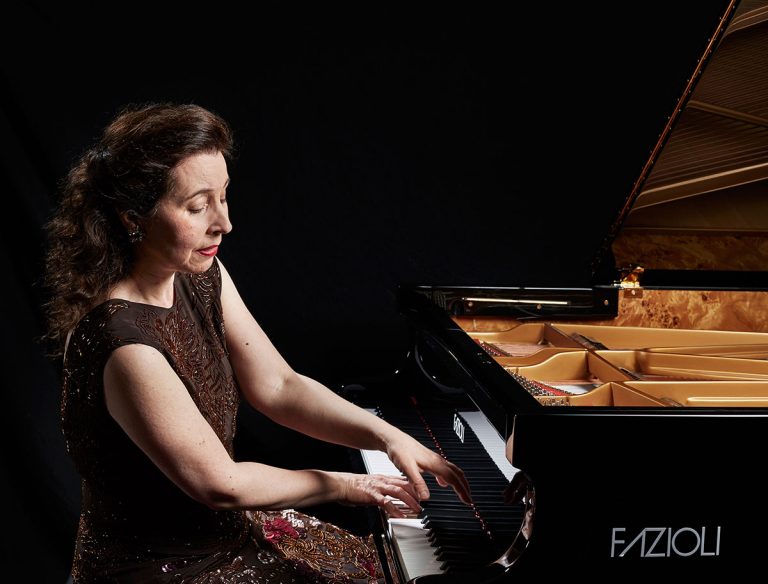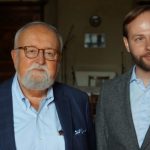Your father Godfrey Hewitt was a choirmaster in the Christ Church Cathedral in Ottawa. How did his function and mission affect your relationship to music and your musical focus? How did your family cultivate music?
I began playing a toy piano at the age of two, and the real piano when I was 3. My mother was my first teacher, and evidently I asked for a lesson every day. It was always a happy thing for me, playing the piano. Music was part of everyday life at home, so it seemed a natural thing to do, which was great. But I also did classical ballet from the age of 3, played the violin and recorder, sang, did Scottish dancing, and went to a normal school. It was good to have such a well-rounded education.
My organist father passed on to me his love of Bach when I was a little child, and both my parents always taught me Bach in a proper manner. That was very lucky for me. And all of my piano teachers after that stressed the importance of learning his keyboard music. So I have worked on Bach all my life, non-stop. It takes great patience, diligence, intelligence, and courage!
It was great to grow up listening to choral music in church (and singing it as well) because it gave me tremendous experience with polyphony and voice-leading. That is invaluable for a Bach player.
Your name is often connected with Canadian pianist Glenn Gould. Have you been influenced by his approach to Bach’s music? Have you ever met him? Did his interpretation inspire you or, on the contrary, do you disagree at some points with his approach?
Of course I watched Glenn Gould on Canadian television (black and white in those days!) when I was a child, and even then knew he was a bit strange (though he could certainly play the piano!), and we listened to his LPs, but never to the point of imitating him. That wouldn’t have worked. One of my teachers in Toronto, Myrtle Guerrero (with whom I studied from the age of 12-14), was the wife of Gould’s only teacher, Alberto Guerrero. That’s the closest connection I have with him.
I never heard him in concert (my parents did) because he gave up playing in public soon after I was born. Many of my friends (mostly now dead) knew him when he was growing up in Toronto. I know that he did call up CBC Radio one day (our national broadcaster) to ask about the piano recital that was playing on the radio—wanting to know who was playing and where it was coming from. It was one of my concerts from the National Arts Centre in Ottawa. I also met his father in 1985—after I won the Bach Competition in Toronto—his father was then already well into his 90s. That was nice.
We both “specialized” in playing Bach’s music on the piano, yes, but the similarities end there. We were totally different people: he hated daylight and the sun; I love it. He hated the colour red; it’s my favourite colour. He didn’t really enjoy contact with his audience; that is what keeps me going in life. I think the differences in our interpretations speak for themselves really. That is not to take away from his immense gift and accomplishments.
You record and play concerts with your personal Fazioli piano (concert grand F278). What do you consider to be the best features of your instrument? Is your piano specially adjusted (similarly as was Glenn Gould’s piano)?
The Fazioli piano is a remarkable creation. Not only is it beautiful in design, but it is a piano on the very highest level, and the quality of each instrument is extremely high. [Paolo Fazioli] tries each one personally (he is not only an engineer but a pianist). The action is incredibly responsive to every variation in touch, and everything I imagine in my head I can produce with my fingers. It gives me complete freedom to play as I wish. The sound is also very coloured. Other pianos can have a beautiful sound but are much less interesting because the sound cannot be varied to such an extent as on a Fazioli. With the Fazioli you can get great power but also wonderful delicacy which, nevertheless, does not lose its brilliance. The high frequencies and reverberations are always there. This is a great feeling! It has wonderful clarity, especially in the lower register.
But unfortunately in Prague I will not be playing one!! I’ll do my very best on the Steinway.
How would you describe your relationship to harpsichord, hammerklavier, and other instruments used in Bach’s time?
I am always interested in trying them out, and I think it’s important to know what the music sounded like on harpsichord or fortepiano—especially in the case of Beethoven. I have only ever played harpsichord in public as a continuo instrument—conducting a baroque programme from the keyboard. The piano is, in my opinion, superior as a solo instrument, as it can imitate the cadence of the human voice (meaning that it can play two notes and have the second one softer that the first—to taper a phrase). That is why it was invented! When I play the harpsichord, I get frustrated that I can’t do that.
You say learning Bach by heart is one of the most difficult things ever. What is your experience with music memorization in this regard?
Yes, it takes great concentration because you’re playing all these different voices at once, and if you put one finger wrong, the whole thing gets off. And it’s not easy to improvise a Bach fugue! When you’re young, you rely a lot on finger memory (reflex memory), but when you get older this starts to fade. So you absolutely have to have it securely backed up by knowing everything you are doing, memorizing the fingering, the places where you can go wrong—everything.
You have recently recorded, after 15 years, Bach’s Goldberg variations again. What do you see your shift in the perception and interpretation of this music?
I am also coming to Prague just after a week in which I will re-record all Six Partitas of Bach—20 years after my first recording of them for Hyperion. It’s not so much that my perception or even interpretation has changed, but….I’ve lived for 20 more years (and everything we experience in life goes into how we play); I now play Fazioli, and as I’ve said, that gives much more colour. My playing is more flexible, more joyous, more everything, really. I think if you listen to both versions of the Goldberg (and then of the Partitas) you will hear this!
You are currently working on The Bach Odyssey. Could you tell us more about this project?
It was back in 2014 that the director of London’s Wigmore Hall approached me to perform the complete solo works of Bach in twelve recitals over four years. My first reaction was to say no, because I had already done it in concert and on CD over 11 years ago (from 1994-2005), and there is still so much other repertoire I must do before it’s too late. But it didn’t take long to change my mind, and now that the project is in full swing, it’s truly a marvellous thing to revisit it all. The cities that are taking the whole cycle are London, Tokyo, Ottawa, and New York, with most of it also presented in Florence. It will finish in June 2020. These concerts are turning out to be highlights of my life, and it gives me enormous pleasure to share such great music with audiences around the world.
Your artistic life is not only associated with Bach’s music. Still, you often return to Bach’s themes: Your project called Angela Hewitt’s Bach Book has inspired contemporary authors to create new compositions. Who did you collaborate with and what was the result?
The result is a lovely collection, published by Boosey & Hawkes, that brings together short pieces written by six contemporary composers, commissioned by me, which are all somehow inspired by the music of Bach. So we have a Fantasia and Fugue by Kurt Schwertsik; a Prelude and Chorale by Brett Dean (with a direct transcription of Bach’s “Gute Nacht, o Wesen”; a Partitina by Robin Holloway, based on the bass of the Goldberg Variations; a Fantasy on BACH by Yehudi Wyner; a Bach Study by Elena Kats-Chernin; and another Fantasia on BACH by Dominic Muldowney. Also included in the book are three of my own Bach transcriptions of organ chorales that I recorded for Hyperion; and several transcriptions originally included in a Bach Book for the British pianist Harriet Cohen (by Herbert Howells and William Walton). I think it’s something very special!
To which of your upcoming concerts are you most looking forward and why?
Well, of course I have to say Prague! You have such a beautiful hall in the Rudolfinum, and it’s a great pleasure to play there. Otherwise I have lots to look forward in the New Year, including my debut (finally!) in Vienna’s famous Musikverein, performing and conducting two Bach Concertos with the Vienna Tonkünstler Orchestra next March.
What would you tell young Czech pianists? If you were to pass on one of your key experiences to young musicians, what would it be?
If you’re really serious about wanting to make a career as a concert pianist, and if you have the gifts for it, then just keep working. Don’t expect it all to be handed to you on a silver platter. You have to work at the whole business side of it as well, contact people, think of projects you want to do, try many different things. Don’t expect an agent to do everything for you! They can help, of course, but your own input is crucial.



